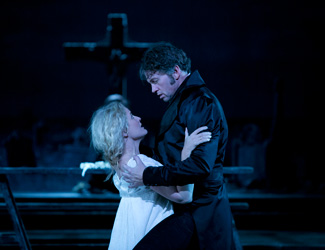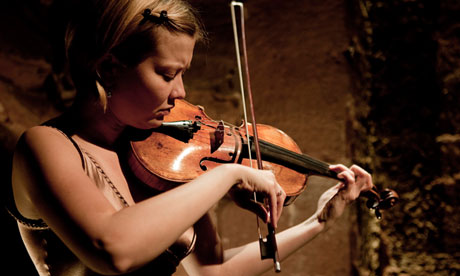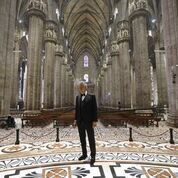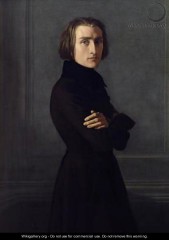Teddy Tahu Rhodes Talks About The Dark Side With The New ‘Don’
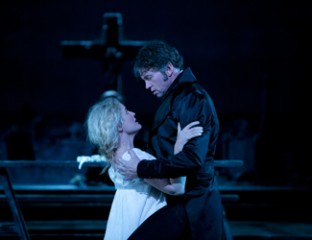
The eagerly anticipated new staging of Don Giovanni, directed by Sir David McVicar has opened in Sydney. Judging by its enthusiastic reception on opening night, it didn’t disappoint.
One of Sydney’s favourite baritones, Teddy Tahu Rhodes reprised his role as the ‘Don’ – and who can forget his explosive, leather clad appearance on stage in the popular Goran Jarvefelt production, last presented in Sydney in 2011. For Rhodes, McVicar’s conception is an opportunity to re-invent the character that he has made his own in a city where his portrayal of the Jarvefelt ‘Don’ has enjoyed iconic status. SoundsLikeSydney spoke with Teddy Tahu Rhodes at Opera Australia’s Surry Hills studios as he contemplated his new role.
Rhodes’ gentle and self-effacing manner is at odds with his penchant for portraying bad guys – Escamillo in Carmen, Joe de Rocher in Dead Man Walking, Stanley Kowalski in A Streetcar Named Desire and Scarpia in Tosca, as well as the ‘Don’. Having sung the role in Bordeaux and in Cincinatti as well, he says “The new production is a chance to put away all the productions I’ve done before and walk into the room completely fresh. Maybe as I get a bit older they might give me a bit less of climbing ladders on stage,” he says, laughingly referring to his previous entree to stage as the ‘Don’.
“Of course there is a preconceived idea of how you’ve done the role before, but when the director asks you to do something different in a production and you’re surrounded by a different set and characters, it immediately changes the way you present the music or the dialogue. The music itself doesn’t change so inevitably there are parts that you still perform in the same way. I’m older too. When I first started doing the ‘Don’ I was 35 or 36. Eleven years down the track, the experience that I bring to the role is different – and I like that.” There is even a tinge of grey in the ‘Don’s’ sideburns, this time around.
In a surprise admission, Rhodes confides that he doesn’t find the ‘Don’ to be a difficult singing role. “It’s the other characters” he says, “especially the women Donna Anna and Elvira who have the ‘big sings’. Although the ‘Don’ is the title character, he is surrounded by very strong people and amazing music, much of it performed by the others. So for me the challenge is to draw that focus in and make Don Giovanni the reason for everything else that’s going on.”
Does Don Giovanni have any redeeming features? Rhodes pauses to reflect. “He doesn’t apologise for his life and I think that’s a strength that perhaps endears him to the audience. Even when he’s suffering his final moments he doesn’t waver. There is little that is likeable about him, but in some ways he is very attractive. That’s the key – you’ve got to make him attractive but not by making him a nice guy; you have to make him attractive through his strengths. It wasn’t a good life, but he lived it the way he wanted to.”
Rhodes delves deeper into exploring the dark side. “When you play a villain, you have to be have to be unafraid to make him unattractive. I had a great review once, many years ago when I was playing a pretty dark character. The reviewer commented that I wasn’t afraid to let the audience hate me. It wasn’t something I consciously set out to do, but I’ve always remembered it because I didn’t take it as a compliment at the time although that observation has become so helpful. It’s very easy to be on stage, wanting the audience to like you because it gives you a sense of well-being. Out of the hundreds of reviews I’ve read, I can’t remember any other comment so succinct. It was a great thing to take on board for every other dark character that I play. It’s got a great deal of insight -‘Don’t be afraid to be disliked’.”
Fortuitously, Rhodes quite easily leaves his malevolent alter-egos behind on stage, and doesn’t internalise the personae he plays beyond his curtain call, a strategy he learnt after playing Joe de Rocher relatively early in his career. “I found myself immersed in ‘Joe’ for a while because he was an engrossing character. It was early days and I found myself constantly thinking about him. I was not that character outside the stage but he consumed my thoughts, and I was nervous about it.”
Rhodes’ career in Australia kicked off with the opportunity to play Dandini in Cenerentola at short notice for Opera Australia. It was life changing. Had he considered the offer too carefully, he believes he may not have accepted it. ” I never thought that I might not be ready for it and thank God I never understood how challenging this career could be and I just went for it.”
Inevitably the conversation turns to roles that await and there is a world of promise as Rhodes’ voice matures like a fruit ripe for plucking at the right moment. “I feel I still have a lot more to explore. The roles which I can’t do now, I will be able to do in 5 years time and that’s the fantastic thing about the voice – there’s always a role for an older man so I can safely transition from the young romantic leads to doing roles which require more gravitas.”
King Philip in Don Carlo and more of Scarpia are two roles Rhodes mentions – and there are others which are under wraps. I asked Rhodes how he would feel about coming back as Claggart having sung the role of Billy Budd in Britten’s eponymous opera. “I would love to!” he says passionately, his eyes lighting up. ” I couldn’t sing Billy Budd ever again but I would just love to play Claggart or come back as Il Commendatore – one day I hope I do! There will be some fabulous young Don Giovanni who will be singing into the grave and for a change, I will be the statue!”
Shamistha de Soysa for SoundsLikeSydney©

